
Blue Skies is a 1946 American musical comedy film directed by Stuart Heisler and starring Bing Crosby, Fred Astaire, and Joan Caulfield. Based on a story by Irving Berlin, the film is about a dancer who loves a showgirl who loves a compulsive nightclub-opener who can't stay committed to anything in life for very long. Produced by Sol C. Siegel, Blue Skies was filmed in Technicolor and released by Paramount Pictures. The music, lyrics, and story were written by Irving Berlin, with most of the songs recycled from earlier works.
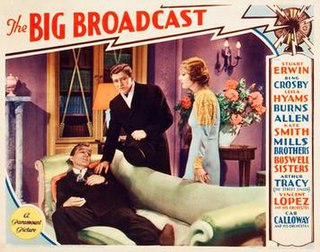
The Big Broadcast is a 1932 American pre-Code musical comedy film directed by Frank Tuttle and starring Bing Crosby, Stuart Erwin, and Leila Hyams. Based on the play Wild Waves by William Ford Manley, the film is about a radio-singer who becomes a popular hit with audiences, but takes a disrespectful approach to his career. His repeated latenesses leads to the bankruptcy of the radio station, but his career is saved by a new friend who buys the station and gives him his job back.

"By The Light of the Silvery Moon" or "By the Light of the Silv'ry Moon" is a popular love song. The music was written by Gus Edwards, and the lyrics by Edward Madden. The song was published in 1909 and first performed on stage by Lillian Lorraine in the Ziegfeld Follies of 1909. It was one of a series of moon-related Tin Pan Alley songs of the era. The song was also used in the short-lived Broadway show Miss Innocence when it was sung by Frances Farr.
"You're Getting to Be a Habit with Me" is a 1932 popular song with music by Harry Warren and the lyrics by Al Dubin, which became a standard. The lyrics of the song were noted for its references to addiction.
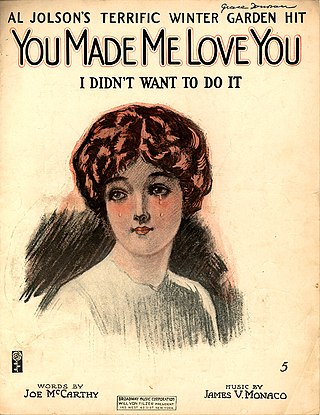
"You Made Me Love You (I Didn't Want to Do It)" is a popular song from 1913 composed by James V. Monaco with lyrics by Joseph McCarthy. It was introduced by Al Jolson in the Broadway revue The Honeymoon Express (1913), and used in the 1973 revival of the musical Irene.

Bing: A Musical Autobiography was Bing Crosby's fourth Decca vinyl LP, recorded and released in 1954.

Bing Sings Whilst Bregman Swings was Bing Crosby's sixth LP, his first album for Verve, recorded and released in a mono format in 1956.
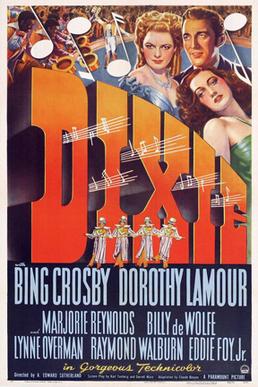
Dixie is a 1943 American biographical film of songwriter Daniel Decatur Emmett directed by A. Edward Sutherland and starring Bing Crosby and Dorothy Lamour. Filming in Technicolor, Dixie was only a moderate success and received mixed reviews. Contrary to rumor, it has not been withdrawn from circulation due to racial issues but is simply one of hundreds of vintage Paramount Pictures from the 1930s and 1940s now owned by Universal and not actively marketed; it was broadcast several times in the late 1980s on the American Movie Classics channel. The film produced one of Crosby's most popular songs, "Sunday, Monday, or Always".

College Humor is a 1933 American pre-Code musical comedy film, directed by Wesley Ruggles, and starring Bing Crosby, Jack Oakie, Richard Arlen, Mary Kornman and Mary Carlisle. Based on a story by Dean Fales, the film is about a college professor and the school's star football player who become rivals for the same beautiful student. Released by Paramount Pictures, the film co-stars George Burns and Gracie Allen.

"I Don't Stand a Ghost of a Chance With You" is a 1932 song recorded by Bing Crosby with Orchestral Accompaniment. The music was composed by Victor Young, with lyrics written by Ned Washington and Bing Crosby. The song is a jazz and pop standard recorded by many different artists.
"Make Believe" is a show tune from the 1927 Broadway musical Show Boat with music by Jerome Kern and lyrics by Oscar Hammerstein II.

Too Much Harmony is a 1933 American black-and-white pre-Code musical film directed by A. Edward Sutherland and starring Bing Crosby, Jack Oakie, Richard "Skeets" Gallagher, Harry Green, and Judith Allen. It was released by Paramount Pictures.
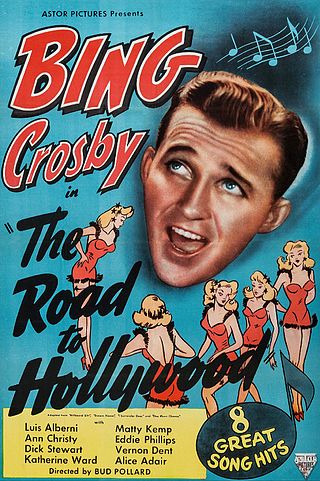
The Road to Hollywood is a 1947 American film released by Astor Pictures that is a combination of several of Bing Crosby's Educational Pictures short subjects. The title was designed to draft off Paramount Pictures' "Road to..." film series starring Crosby, Bob Hope, and Dorothy Lamour; Hope and Lamour do not appear in the film.
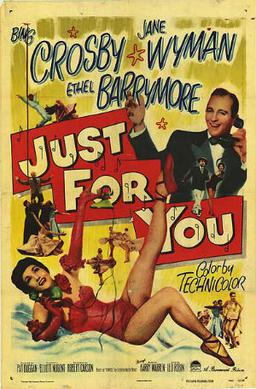
Just for You is a 1952 American musical film starring Bing Crosby and Jane Wyman and the final motion picture to be directed by Elliott Nugent. It was nominated for Best Song at the 1953 Academy Awards. The film was based on the book Famous by Stephen Vincent Benét. Filming took place between October 22 and December 20, 1951. It is said that Judy Garland had originally been sent a script as she was being considered for the female lead, but she apparently decided not to proceed with the project. Location scenes were filmed at Lake Arrowhead, near San Bernardino, California and at Big Bear Lake in the San Bernardino National Forest.

One More Chance is a 1931 Educational-Mack Sennett Featurette starring Bing Crosby and directed by Mack Sennett. This was the second of the six short films Crosby made for Sennett and which helped launch his career as a solo performer. This film is notable for Crosby first singing on film his classic hit "Wrap Your Troubles in Dreams" which is sung to a bevy of giggling overweight Native American maidens who gradually close in on him. He also sings "Just One More Chance" which topped the various charts of the day in 1931.
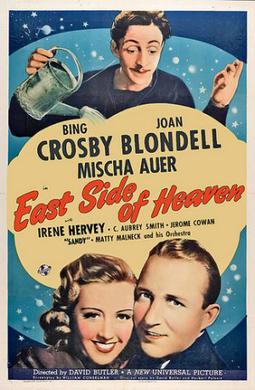
East Side of Heaven is a 1939 American musical film directed by David Butler and written by William M. Conselman and James V. Kern. The film stars Bing Crosby, Joan Blondell, Mischa Auer, Irene Hervey, C. Aubrey Smith, Robert Kent and Jerome Cowan. Filming took place in Hollywood from January 13 to March 7, 1939. The film was released on April 7, 1939, by Universal Pictures and had its New York premiere at Radio City Music Hall on May 4, 1939. This was another independent production in which Crosby had a financial interest.
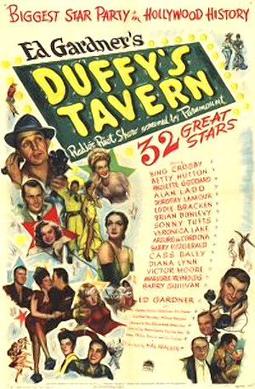
Duffy's Tavern is a 1945 American comedy film directed by Hal Walker and written by Melvin Frank and Norman Panama. The film stars Ed Gardner, Bing Crosby, Betty Hutton, Paulette Goddard, Alan Ladd, Dorothy Lamour, Eddie Bracken and Brian Donlevy. The film was released on September 28, 1945, by Paramount Pictures.

Road to Bali is a Decca Records studio album by Bing Crosby, Bob Hope and Peggy Lee of songs featured in the film Road to Bali released in 1952. All of the songs were written by Jimmy Van Heusen (music) and Johnny Burke (lyrics). The songs were featured on a 10” vinyl LP numbered DL 5444 and in a 3-disc 45rpm box set numbered 9-375.

Blue of the Night is a 1933 Mack Sennett Star Comedy directed by Leslie Pearce and starring Bing Crosby. It was the last of the six short films Crosby made for Mack Sennett and which helped launch his career as a solo performer.
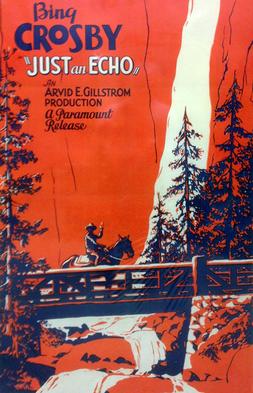
Just an Echo is a 1934 Paramount short starring Bing Crosby and directed by Arvid E. Gillstrom. This was the second of two short films Crosby made for Paramount in May / June 1933, the other being Please.


















